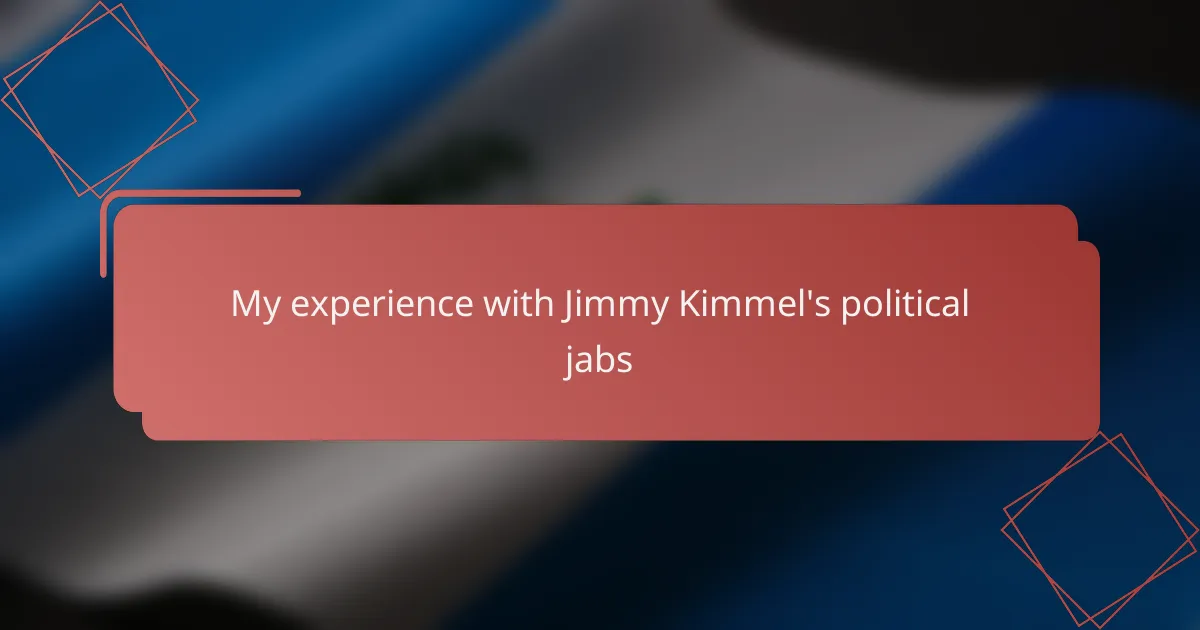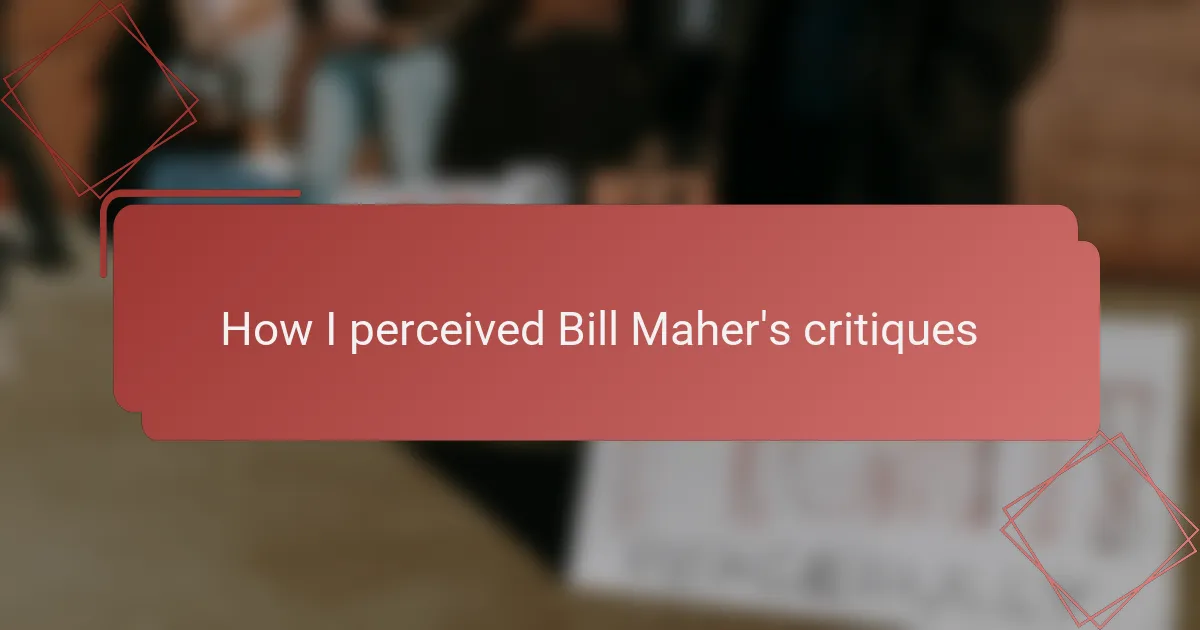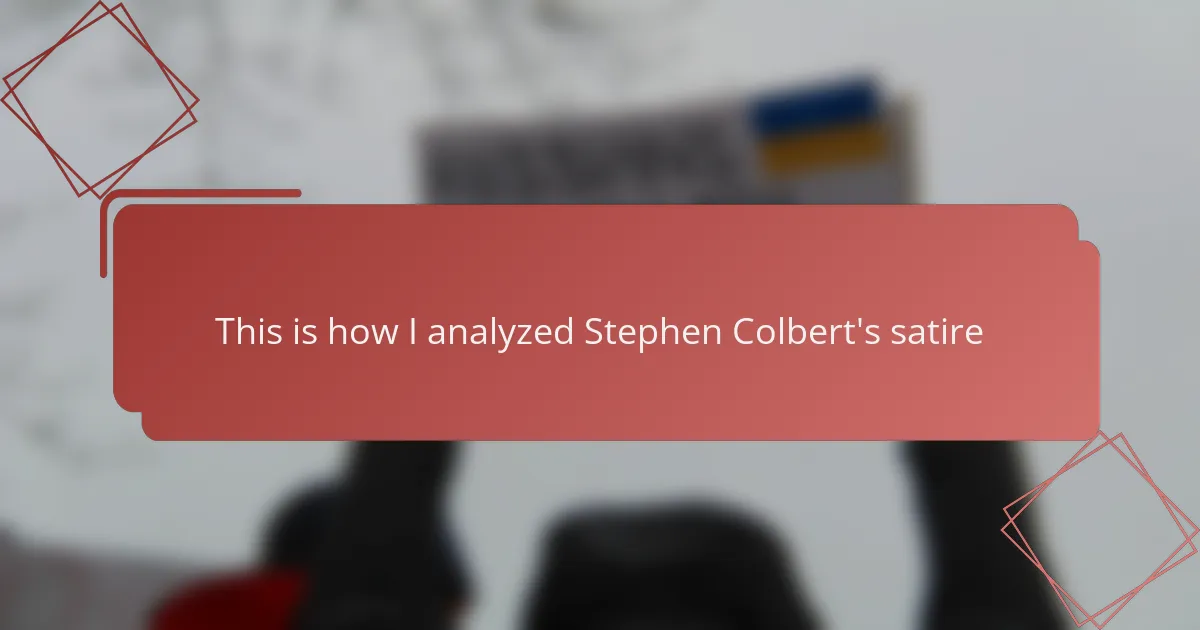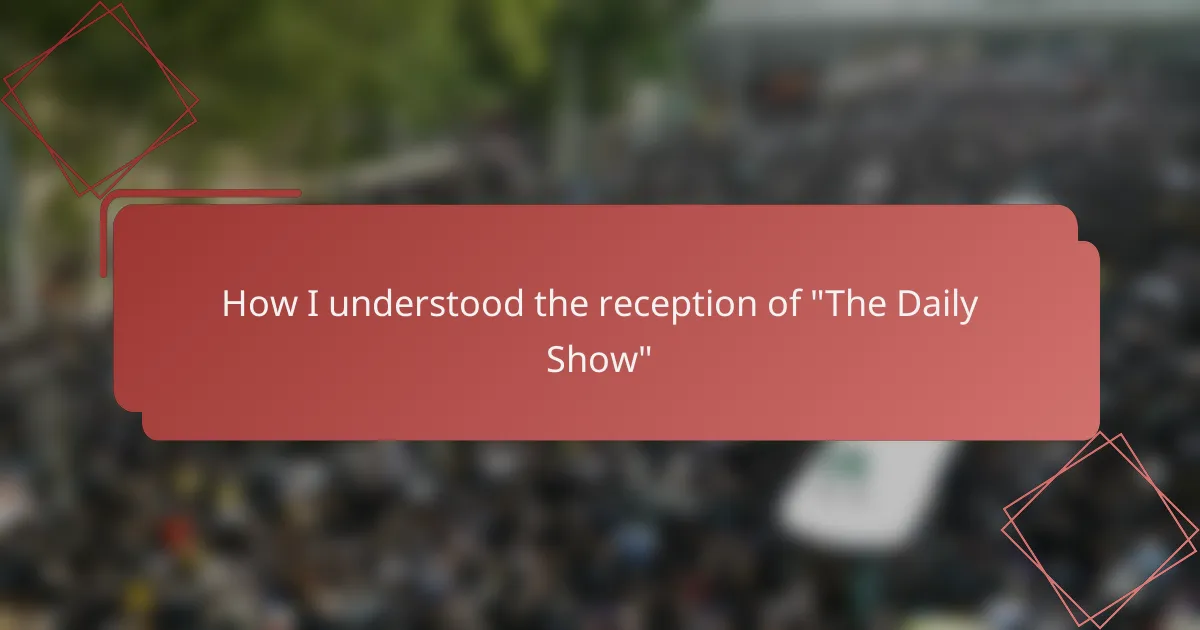Key takeaways
- Political satire serves as a powerful tool for social commentary, blending humor with critical reflection on authority and political issues.
- Jimmy Kimmel’s style blends relatable anecdotes and sharp critiques, making complex topics accessible and encouraging deeper thought.
- Effective use of satire in discussions can foster open dialogue and lower defenses, facilitating critical engagement without alienating others.
- Humor in political satire can humanize serious issues, prompting audiences to re-examine their opinions and embrace discomfort for meaningful insights.
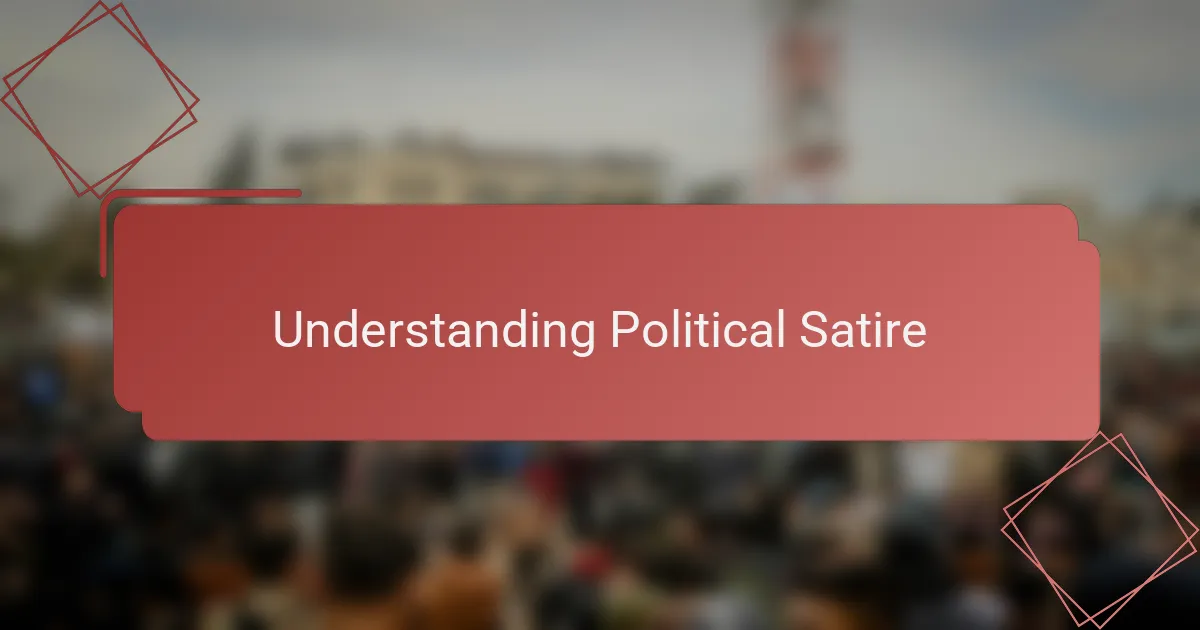
Understanding Political Satire
Political satire, to me, feels like a clever mirror reflecting the absurdities of power and politics. It uses humor as a lens, exposing truths that might otherwise be ignored or too tough to face head-on. Have you ever noticed how a well-timed joke can reveal more about a politician’s weaknesses than a serious debate ever could?
I’ve always thought that political satire works best when it challenges us to question authority while making us laugh—sometimes nervously. It’s not just about mocking public figures; it’s about spotlighting the contradictions and hypocrisies in a way that sparks thought, sometimes discomfort. Don’t you find it fascinating how humor can be a powerful tool for social commentary?
From my experience, understanding political satire means recognizing its dual role: entertaining the audience and provoking reflection. It’s this balance that makes figures like Jimmy Kimmel intriguing in their approach—they don’t just make jokes; they push us to reconsider the political landscape through their punchlines. Have you ever caught yourself thinking more deeply about an issue right after a satirical segment? That’s the magic of the genre.
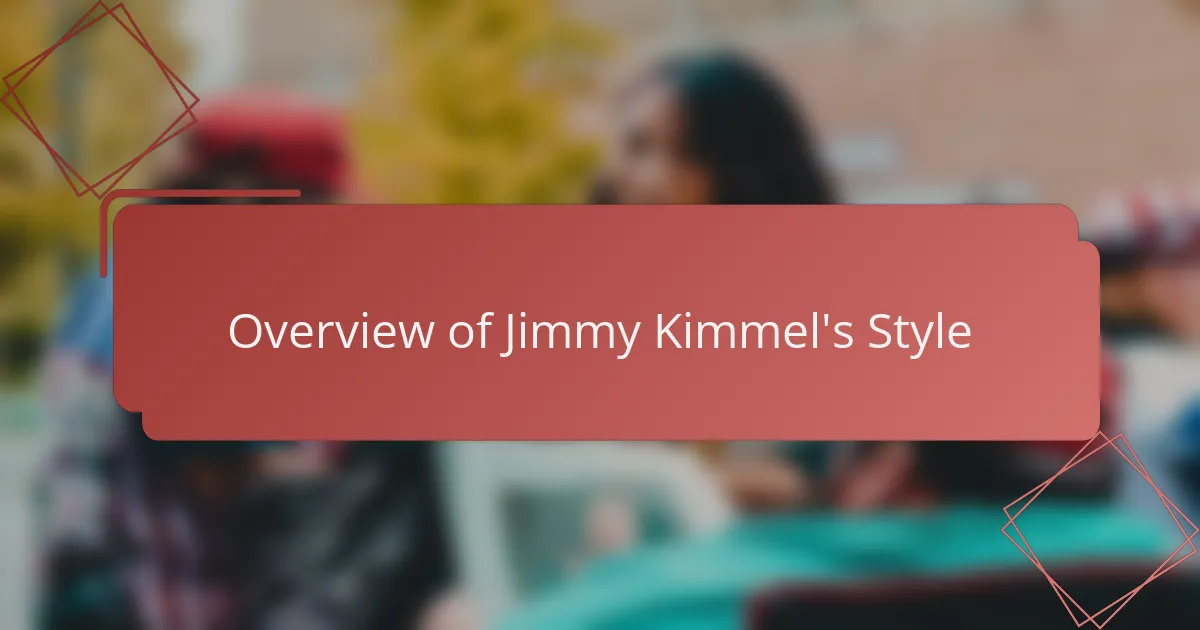
Overview of Jimmy Kimmel’s Style
Jimmy Kimmel’s style is sharp but approachable, blending humor with pointed political commentary in a way that feels both entertaining and thought-provoking. I’ve noticed he often uses personal stories to connect with the audience, which makes his jabs hit harder because they feel genuine, not just rehearsed.
One thing that stood out to me is how Kimmel balances sarcasm with empathy. His jokes aren’t just meant to criticize; they come across as invitations to reflect on deeper issues. This approach helped me see political satire as more than just comedy—it can be a bridge to understanding complex topics.
- Conversational tone that feels relatable and sincere
- Use of personal anecdotes to humanize political issues
- Sharp wit combined with moments of emotional vulnerability
- Focus on current events with a clear political stance
- Integration of humor that encourages reflection, not just laughter
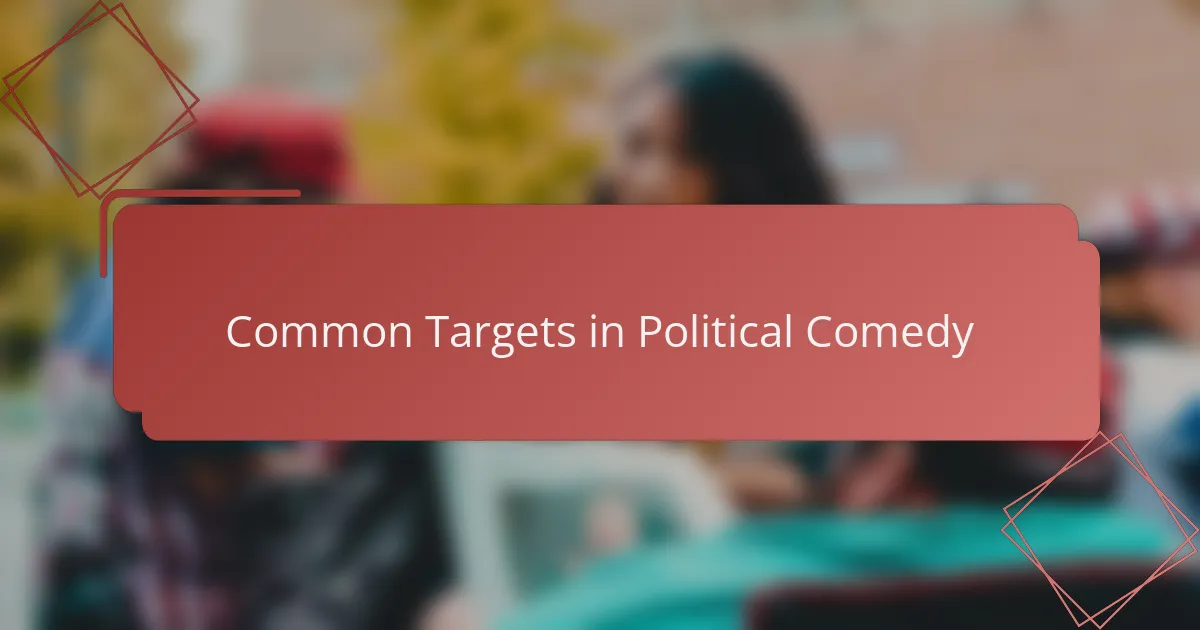
Common Targets in Political Comedy
Common targets in political comedy often revolve around politicians, government policies, and societal issues. From my perspective, Jimmy Kimmel zeroes in on the absurdities of political figures, frequently poking fun at their contradictory statements and public gaffes. I remember laughing out loud when he shrewdly highlighted the flip-flopping stances of certain leaders—it’s that raw exposure of hypocrisy that makes his jabs hit home.
| Target | Kimmel’s Approach |
|---|---|
| Politicians | Mocks inconsistencies and humanizes them by revealing their flaws humorously. |
| Government Policies | Highlights contradictions and questions effectiveness through satire. |
| Societal Issues | Uses relatable humor to bring attention to broader public concerns and their political impact. |
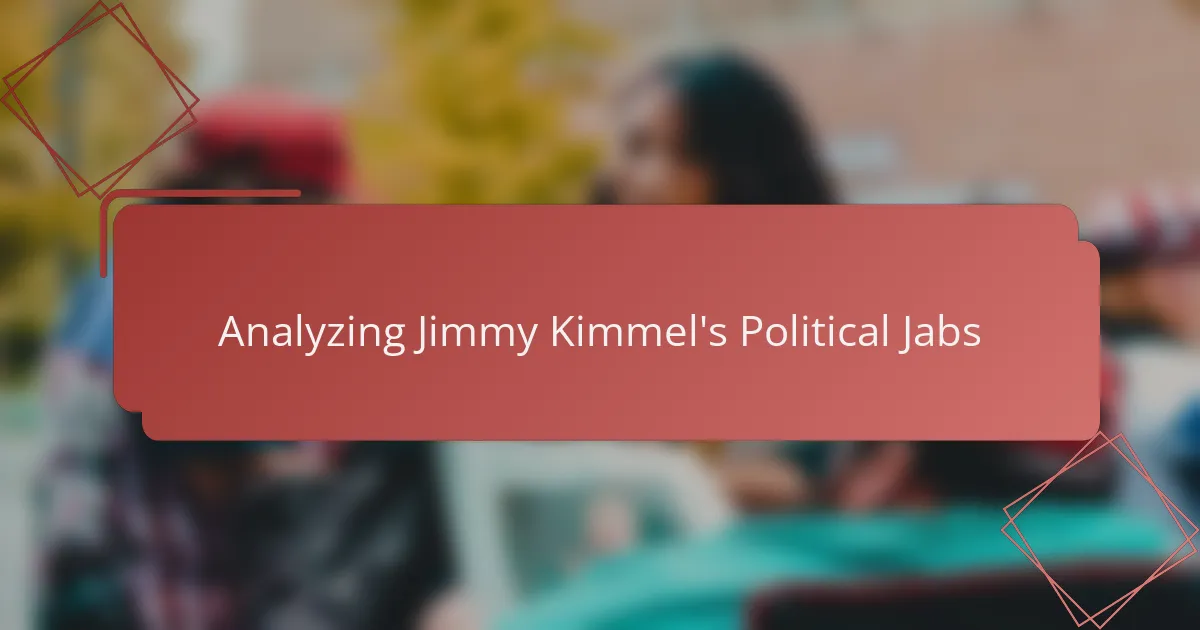
Analyzing Jimmy Kimmel’s Political Jabs
Analyzing Jimmy Kimmel’s Political Jabs
When I reflect on Jimmy Kimmel’s political jabs, what strikes me most is his ability to blend humor with sharp critique. His monologues often hit close to home, making me laugh while also prompting deeper thought about current events. I’ve noticed his tone shifts with the political climate, sometimes more biting, other times seemingly empathetic, which shows his keen sense of timing and understanding of his audience.
| Aspect | Jimmy Kimmel’s Approach |
|---|---|
| Style | Satirical yet conversational, mixing humor with emotional appeal |
| Targets | Politicians across the spectrum, often focusing on controversial policies and gaffes |
| Impact | Engages viewers emotionally and intellectually, sparking conversations beyond comedy |
| Frequency | Regular segments in his show, often tied to current political events |
| Personal Touch | Anecdotes and personal stories that make political issues relatable |
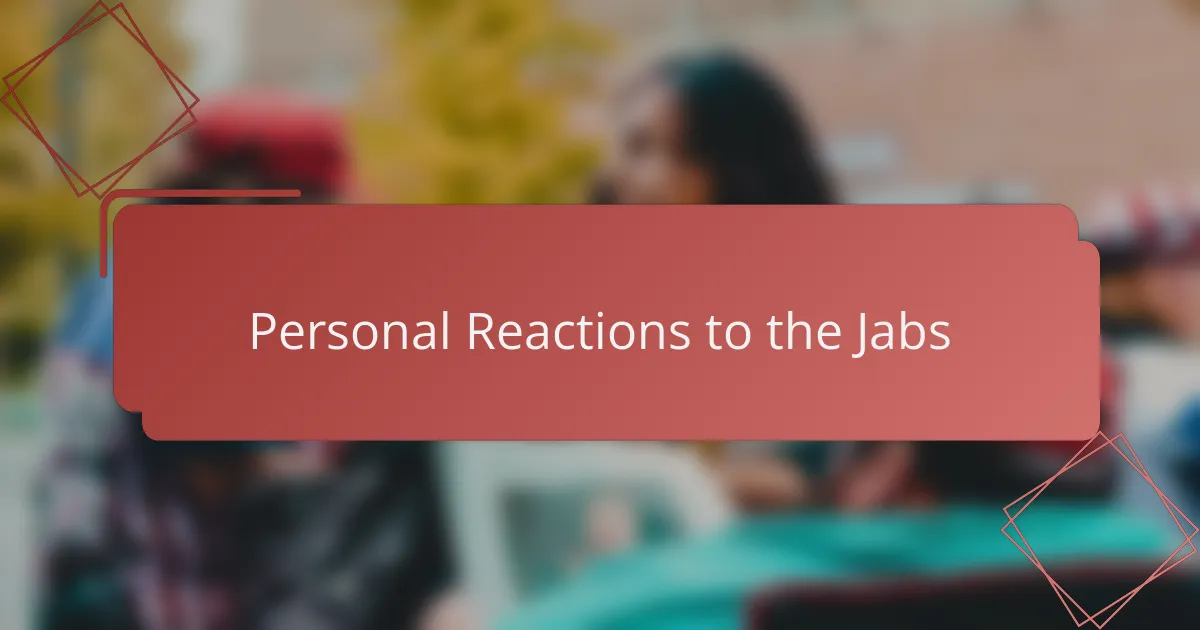
Personal Reactions to the Jabs
I found Jimmy Kimmel’s political jabs both sharp and thought-provoking. At times, they hit close to home, making me reflect on the absurdities within our political system. His ability to mix humor with biting critique keeps me engaged without feeling overwhelmed by negativity.
| Aspect | My Reaction |
|---|---|
| Humor | Clever and often unexpected, which made me laugh while thinking deeply. |
| Emotional Impact | At moments, felt personal and raw; sometimes left me uneasy but intrigued. |
| Effectiveness | Balanced satire with sharp political insight effectively without alienating viewers. |
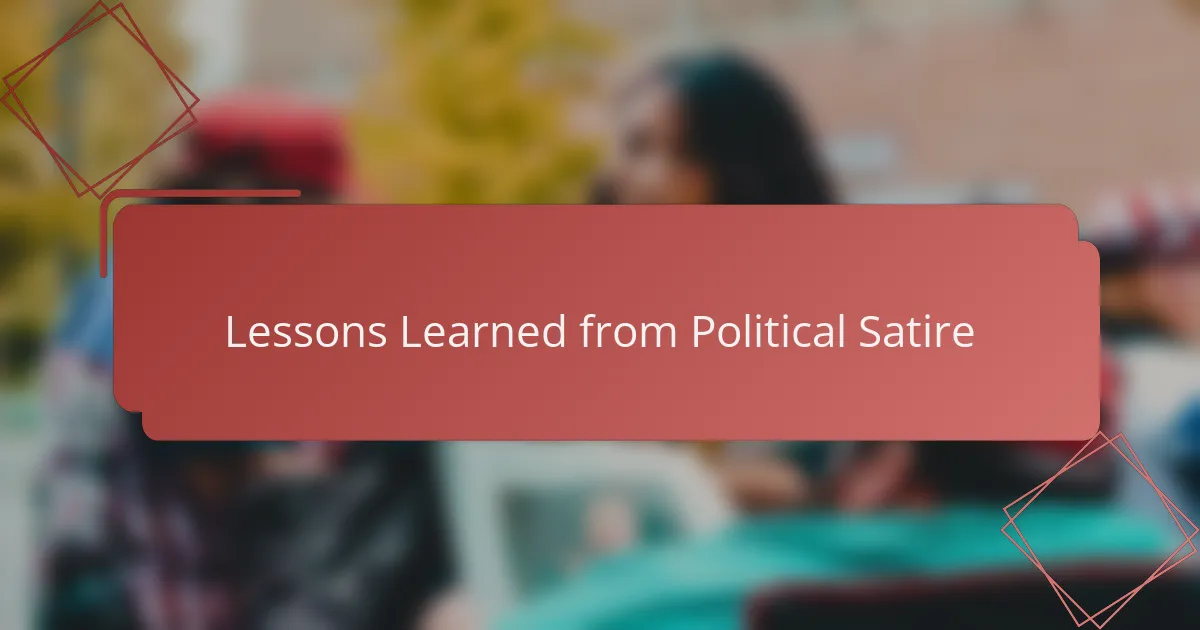
Lessons Learned from Political Satire
Political satire has taught me that humor can be a powerful catalyst for critical thinking. When satire makes me chuckle at a politician’s blunder, it also nudges me to dig beneath the surface and question what’s really at play. Have you ever found yourself laughing and then suddenly re-examining your own opinions? That’s the subtle lesson satire delivers.
Another important takeaway is how satire can humanize political issues without diluting their seriousness. I recall feeling both amused and unsettled when a joke struck just the right emotional chord, making complex policies suddenly accessible and personal. This mix of humor and empathy is what keeps me engaged rather than turning away from a topic that might otherwise feel too heavy.
Finally, satire reminds me that no political figure or idea is beyond scrutiny—not with kindness, but with honesty wrapped in wit. It encourages a balance between skepticism and openness. Could it be that satire’s real lesson is about embracing discomfort as a path to understanding? From my experience, leaning into that discomfort often leads to the most meaningful insights.

Applying Political Satire in Everyday Discussions
Applying political satire in everyday conversations has always felt like walking a fine line to me. How do you bring up a biting joke about a recent policy without derailing a friendly chat? What I’ve learned is that timing and tone matter just as much as the content. A well-placed quip can break tension and invite people to see issues from a fresh angle without turning discussions sour.
I’ve tried weaving in satire when discussing politics with friends and family, and it often opens doors to deeper dialogue. For instance, referencing one of Jimmy Kimmel’s jabs about a political flip-flop usually sparks laughter but also nudges us to question the sincerity behind politicians’ words. It’s amazing how humor lowers defenses, making it easier for folks to engage critically without feeling attacked.
That said, I’m careful not to let satire become a weapon that shuts down conversations. When I sense someone’s not in the mood for sarcasm, I switch gears to straightforward talking points. This flexibility, I believe, keeps political satire effective in everyday talks – it’s about inviting reflection, not alienation. Have you noticed how sharing a clever joke sometimes leads to unexpectedly thoughtful exchanges? That’s where satire truly shines in real life.
